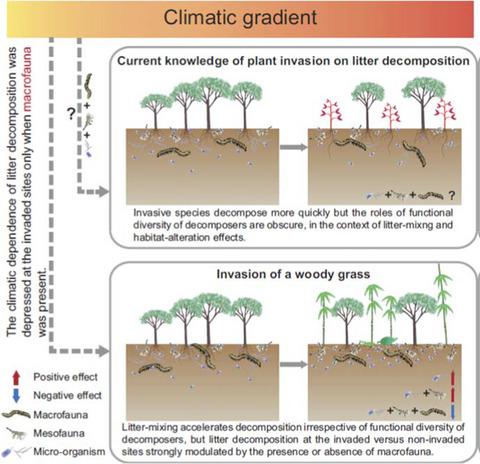Our official English website, www.x-mol.net, welcomes your
feedback! (Note: you will need to create a separate account there.)
Functional diversity of decomposers modulates litter decomposition affected by plant invasion along a climate gradient
Journal of Ecology ( IF 5.3 ) Pub Date : 2020-11-01 , DOI: 10.1111/1365-2745.13548 Junwei Luan 1, 2 , Shirong Liu 3 , Siyu Li 1 , Joann K. Whalen 2 , Yi Wang 1 , Jingxin Wang 4 , Yanchun Liu 5 , Wei Dong 6 , Scott X. Chang 7, 8
中文翻译:

分解者的功能多样性沿着气候梯度调节受植物入侵影响的凋落物分解
更新日期:2020-11-01
Journal of Ecology ( IF 5.3 ) Pub Date : 2020-11-01 , DOI: 10.1111/1365-2745.13548 Junwei Luan 1, 2 , Shirong Liu 3 , Siyu Li 1 , Joann K. Whalen 2 , Yi Wang 1 , Jingxin Wang 4 , Yanchun Liu 5 , Wei Dong 6 , Scott X. Chang 7, 8
Affiliation

|
- Litter decomposition is fundamental to carbon (C) and nutrient cycling in ecosystems, which could be altered by plant invasion. The impacts of plant invasion on litter decomposition are generally predicted by trait difference between leaf litters of invasive and non‐invasive species. However, plant invasion not only changes litter composition, but might also increase the activity or change the functional diversity of decomposers to alter litter decomposition, which is barely studied, and the effect could be different under varied climate conditions.
- We studied decomposition of litters from non‐invasive and invasive native plants, as affected by litter treatments (in a mixture or alone) and decomposer organisms of different functional groups (by controlling the mesh size of litterbags), in sites with or without an invasive woody grass, Moso bamboo Phyllostachys edulis, at seven locations across a climate gradient.
- We show that greater decomposer functional diversity, particularly the presence of macrofauna, accelerated the cycling of litter C and nitrogen (N), increased the climatic sensitivities of decomposition rates, but decreased the N use efficiency of decomposers (represented by litter C to N loss ratio). Litter decomposed in mixtures decomposed faster (by 9.5%) and had more N loss (by 28.9%) than that of the monoculture, regardless of the functional diversity of decomposers. In contrast, the invasion of Moso bamboo slowed decomposition and decreased N use efficiency; this negative effect could be reversed when macrofauna were excluded from the decomposition process, which challenges the nutrient facilitation hypothesis. Bamboo invasion depressed the climatic sensitivity of decomposer functional groups when macrofauna were present but not when macrofauna were excluded.
- Synthesis. We found that the functional diversity of decomposer organisms modulates and largely determines litter decomposition affected by a woody grass invasion along a climate gradient. These results suggest that, under current and future climate, including the changes in decomposer functional groups, particularly macrofauna, and their interaction with litter traits, would provide a mechanistic and more reliable prediction on ecosystem functions altered by invaders than a functional trait‐based framework.
中文翻译:

分解者的功能多样性沿着气候梯度调节受植物入侵影响的凋落物分解
- 凋落物分解是生态系统中碳(C)和养分循环的基础,植物入侵可能会改变这种分解。植物入侵对凋落物分解的影响通常可以通过入侵和非入侵物种的凋落物之间的性状差异来预测。然而,植物入侵不仅改变了凋落物的组成,而且还可能增加分解物的活性或改变分解物的功能多样性,从而改变凋落物的分解,这鲜有研究,而且在不同的气候条件下其影响可能会有所不同。
- 我们研究了在有无侵入性场所中,受凋落物处理(混合或单独使用)和具有不同功能组的分解生物(通过控制垃圾袋的网眼大小)的影响,从非侵入性和侵入性本地植物中分解出的凋落物。木本草,毛竹毛竹,在气候梯度的七个位置。
- 我们显示出更大的分解器功能多样性,尤其是大型动物的存在,加速了凋落物C和氮(N)的循环,增加了分解速率的气候敏感性,但降低了分解者的氮利用效率(以凋落物C到N的损失表示)比率)。与分解培养物的功能多样性无关,混合物中的凋落物分解速度更快(降低了9.5%),氮素损失(降低了28.9%)。相反,毛竹的入侵减慢了分解速度,降低了氮的利用效率。当大型动物被排除在分解过程之外时,这种负面影响可以逆转,这挑战了营养素促进假设。
- 综合。我们发现分解生物的功能多样性调节并很大程度上决定了凋落物的分解受木本草入侵沿气候梯度的影响。这些结果表明,在当前和未来的气候下,包括分解者功能组(尤其是大型动物)的变化,以及它们与垫料性状的相互作用,相比基于功能性状的框架,将为入侵者所改变的生态系统功能提供机械化,更可靠的预测。











































 京公网安备 11010802027423号
京公网安备 11010802027423号